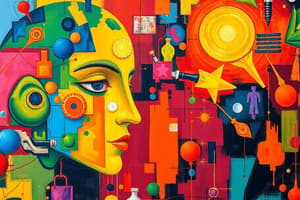Podcast
Questions and Answers
What issue arises when artificial intelligence models use copyrighted works for training without the creators' consent?
What issue arises when artificial intelligence models use copyrighted works for training without the creators' consent?
- Increased accuracy in pattern recognition
- Decreased recognition of specific patterns
- Enhanced collaboration between artists and AI
- Violation of copyright laws (correct)
Why did Dr. Joyce Bolaños wear white masks in her study on facial recognition systems?
Why did Dr. Joyce Bolaños wear white masks in her study on facial recognition systems?
- To improve the accuracy of facial recognition systems
- To evaluate the impact of wearing masks on AI performance
- To avoid being recognized by AI models
- To test the accuracy of facial recognition for women of color (correct)
What potential consequences arise from using biased models in legal or criminal contexts?
What potential consequences arise from using biased models in legal or criminal contexts?
- Enhanced reliability of legal systems
- Improved efficiency in criminal investigations
- False accusations and wrongful imprisonment (correct)
- Increased accuracy in identifying criminals
How did Dr. Bolaños contribute to investigating bias in image generation models?
How did Dr. Bolaños contribute to investigating bias in image generation models?
What is a key reason why it is essential to understand the behavior and limitations of artificial intelligence systems as they become more widespread?
What is a key reason why it is essential to understand the behavior and limitations of artificial intelligence systems as they become more widespread?
How can corporations benefit from the tools that measure the impact of artificial intelligence according to the text?
How can corporations benefit from the tools that measure the impact of artificial intelligence according to the text?
What is the main concern raised about the impact of artificial intelligence on humanity?
What is the main concern raised about the impact of artificial intelligence on humanity?
Which aspect of artificial intelligence does the text NOT mention as a potential concern?
Which aspect of artificial intelligence does the text NOT mention as a potential concern?
What solution is mentioned for reducing energy consumption and carbon emissions from AI models?
What solution is mentioned for reducing energy consumption and carbon emissions from AI models?
Which company's large language models are highlighted for significant energy consumption and carbon dioxide emissions?
Which company's large language models are highlighted for significant energy consumption and carbon dioxide emissions?
What is the purpose of the 'Did My Art Train You?' tool developed by Spawning.ai?
What is the purpose of the 'Did My Art Train You?' tool developed by Spawning.ai?
Which action has NOT been taken by technology companies regarding large AI models according to the text?
Which action has NOT been taken by technology companies regarding large AI models according to the text?
Study Notes
- Gaith Takrity and Hani Eldalees have researched artificial intelligence for over a decade.
- They received an unexpected email stating that working in artificial intelligence would harm humanity.
- Artificial intelligence topics cover various aspects, from groundbreaking discoveries to mundane issues like marital advice and diet plans.
- Some discussions revolve around potential risks and ethical dilemmas, such as requiring a divorce or applying a specific diet plan using artificial intelligence.
- Companies in the technology sector have been accused of not disclosing energy consumption and carbon emissions from large artificial intelligence models like Bloom and GPT-3.
- These large language models consume significant amounts of energy and emit a substantial amount of carbon dioxide.
- Smaller models have been developed to replace larger ones with better efficiency and less carbon emissions.
- Artificial intelligence models can be implemented in various devices, including smartphones, search engines, and refrigerators, leading to substantial energy consumption.
- Performing extensive searches in large datasets, such as LAION-5B, can provide clues about the use of creators' works for artificial intelligence training without their consent.
- Spawning.ai, founded by artists, developed a tool called "Did My Art Train You?" to investigate whether their works were used for training artificial intelligence models without their knowledge or permission.
- Creative works, particularly those by artists like Carl Ortiz, can be identified in large datasets and used for artificial intelligence training without the creators' consent, potentially violating copyright laws.
- Spawning.ai recently entered a partnership with Hugging Face, a company that creates access and cancellation tools for large datasets, to address this issue.
- Artificial intelligence models perform pattern recognition and classification, potentially infringing on copyrighted works by recognizing and using specific patterns or features.- Dr. Joyce Bolaños discovered that artificial intelligence systems could not identify her face unless she wore white masks.
- She found that facial recognition systems were significantly less accurate for women of color compared to white men.
- When biased models are used in legal or criminal contexts, it can lead to false accusations and even wrongful imprisonment.
- For instance, Borsha and Wodrow were falsely accused of car theft based on incorrect facial recognition identification.
- The creators of these models cannot determine the reason for their bias or how it was implemented.
- For image generation models, using them in legal contexts can result in labeling individuals as criminals, terrorists, or members of extremist groups, with serious consequences.
- Dr. Bolaños developed the Stable Bias Explorer to investigate the bias in image generation models from a professional perspective.
- By analyzing various images, she discovered a significant representation of white men and women in 150 professions, even when compared to the real world.
- The legal systems and economies we live in already incorporate artificial intelligence, and as these systems become more widespread, it is essential to understand their behavior and limitations.
- There is no easy solution to complex problems like bias, copyright issues, or environmental changes. However, by creating tools to measure the impact of artificial intelligence, we can begin to address these issues as they emerge.
- Start by creating protective barriers for society and the planet.
- Upon obtaining this information, corporations can choose models that are more energy-efficient, respect copyright laws, and honor user privacy.
- Authors who need information to write laws can use these tools to develop new regulatory frameworks or governance structures for artificial intelligence.
- Users like you and me can use this information to choose artificial intelligence models that we trust and feel comfortable with, without having our identities distorted or misrepresented.
- Instead of focusing on potential future threats posed by artificial intelligence, we should address the current and pervasive impacts it has on our lives.
- Artificial intelligence moves quickly, but it is not an unstoppable force. We can work together to determine the direction we want to go in.
- Thank you for your attention. (End of message)
Studying That Suits You
Use AI to generate personalized quizzes and flashcards to suit your learning preferences.
Description
Explore the ethical dilemmas, environmental impact, and biases associated with artificial intelligence through a series of thought-provoking scenarios and discussions. Learn about the potential risks, copyright issues, and societal implications of using AI models in various contexts.




